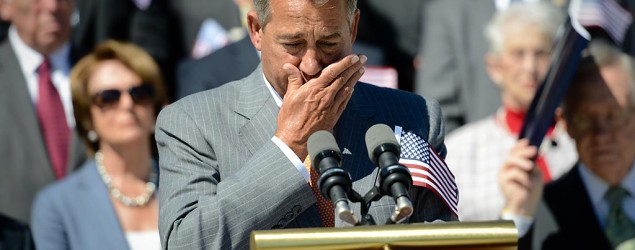Good People,
A rebellious Republican Congress used a budget bill to deliberately stage a confrontation with a Democratic President over spending priorities. GOP militants of Tea Party and radicals of a few Republicans in the House gave John Boehner momentum and together they got frenzy nuts to fix a gridlock in the Government shutdown......that, President Obama's leadership will be into disarray and embarrassed and White House would be forced to cave in. Unfortunately, it seems the plan did not work as they expected. What is more, Boehner has lost it and is regretting and wondering what the heck he got GOP into this mess and to add salt to injury, they have no idea what political dynamics to apply and reopen the Government shutdown without hurting their party.
Turning to cry-baby, was Newt Gingrich in the mood of sharing, offering him a bottle grudgingly ???
Learning from mistakes, are there lessons to be learned here???
Judy Miriga
Diaspora Spokesperson
Executive Director
Confederation Council Foundation for Africa Inc.,
USA
http://socioeconomicforum50.blogspot.com
Diaspora Spokesperson
Executive Director
Confederation Council Foundation for Africa Inc.,
USA
http://socioeconomicforum50.blogspot.com
U.S. House Democrats probe move to reopen government
WASHINGTON (Reuters) - Democratic leaders in the U.S. House of Representatives on Friday announced that they are working on a maneuver that, if successful, would force a vote on legislation to fully reopen the federal government.
The ploy involves a rarely used "discharge petition" that would dislodge an existing bill from a committee and send it to the House floor if a simple majority of lawmakers in the chamber sign the petition.
This legislative route generally faces difficult odds in the House as some members of the majority party - in this case Republicans - would have to defy their party elders by signing a petition for a bill that leadership opposes.
"This is an attempt by us in a bipartisan way to open up the government," House Democratic leader Nancy Pelosi said at a press conference.
Some administration officials privately have expressed concerns over the difficulty of bringing a bill to the floor unless House Speaker John Boehner brings it up.
The move would be slow to play out, even if it were to be successful. It would take a week or so to clear procedural hurdles in the House, according to Democratic Representative George Miller. A House vote, under this ploy, might not come until at least October 14, which is a federal holiday, Miller said.
Asked at a press conference how he would get the 218 votes needed, the California lawmaker said: "We will round them up. We expect to get them in a day."
Democrats said they have their eyes on a bill introduced in March by a conservative Republican, Representative James Lankford, which was aimed at providing automatic funding for government agencies and programs based on prior-year levels in the event Congress failed to pass its normal spending bills.
Since the start of the government shutdown on Tuesday, House Republican leaders have blocked other maneuvers by Democrats to pass a bill granting emergency funding to reopen the government without add-ons to delay or kill the "Obamacare" healthcare plan.
Many Democrats and some Republicans think that if a straight-forward spending bill was put on the House floor, it would pass.
(Reporting by Richard Cowan, Tim Reid, David Lawder and Mark Felsenthal; editing by Jackie Frank)
------------------------------------------------------------
Blaming GOP House Speaker Boehner for shutdown, Dem attack ad compares him to crying baby




0 comments:
Post a Comment